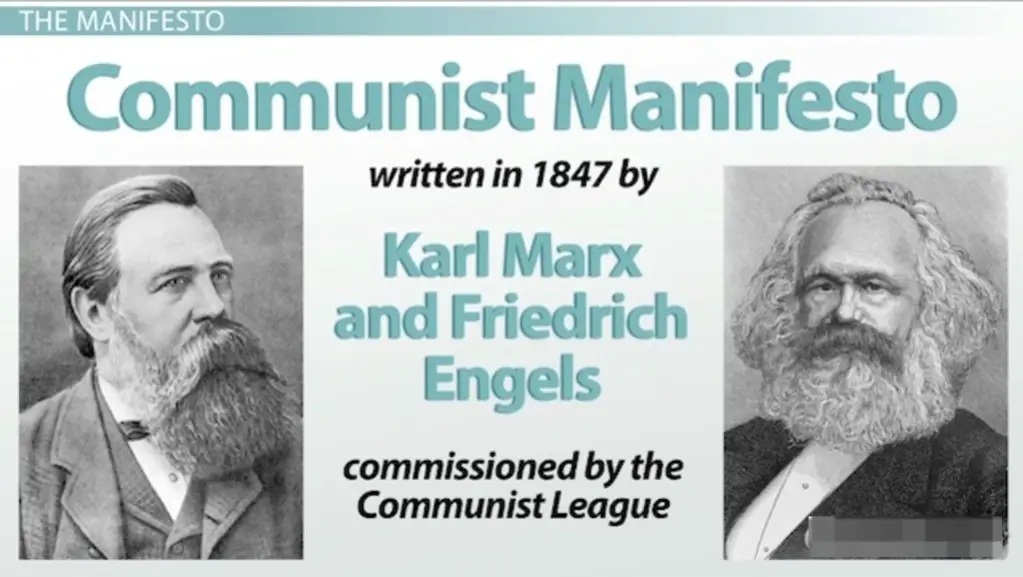Communist Manifesto PDF Free Download
The Communist Manifesto is a foundational political and philosophical text written by Karl Marx and Friedrich Engels. Published in 1848, the manifesto presents a powerful critique of the capitalist system and outlines the principles of communism, calling for a revolutionary transformation of society.
Communist Manifesto PDF Free Download
In the mid-19th century, Europe was undergoing rapid industrialization and urbanization, leading to significant social and economic upheaval. Marx, a German philosopher and economist, and Engels, a German social scientist, sought to analyze the historical forces driving these changes and propose a vision for a more just and equitable future.

The manifesto begins with the famous opening line, “A spectre is haunting Europe – the spectre of communism.” It proceeds to trace the history of class struggle, identifying a pattern of exploitation and oppression of the working class (proletariat) by the bourgeoisie, the capitalist ruling class. Marx and Engels argue that throughout history, societies have been divided into oppressor and oppressed classes, and they predict that the inevitable outcome of this struggle will be a proletarian revolution leading to the establishment of a classless society.
According to the manifesto, the only way to overcome the inequalities of the capitalist system is for the proletariat to rise up in unity, overthrow the bourgeoisie, and establish a new form of social organization. In this envisioned communist society, private ownership of the means of production would be abolished, and the concept of class would cease to exist. The guiding principle would be “from each according to their ability, to each according to their needs,” ensuring that resources are distributed fairly and according to individual needs.
The Communist Manifesto has had a profound impact on world history. It served as a rallying cry for socialist and communist movements worldwide, inspiring workers to unite and advocate for their rights. The manifesto’s ideas influenced the establishment of the First International, a global association of workers and socialists seeking to promote workers’ solidarity across borders.
Over the years, the manifesto has been both praised for its insights into class struggle and criticized for its implementation in various historical contexts. While some societies attempted to realize its vision, they often faced challenges and deviations from Marx’s original ideas, leading to diverse interpretations of communism.
Despite being over 150 years old, the Communist Manifesto remains a thought-provoking and influential document. Its themes of social justice, worker empowerment, and the critique of capitalism continue to resonate with people worldwide. The ideas presented in the manifesto have sparked enduring debates about the nature of society, economics, and governance, ensuring its lasting relevance in the study of political thought.
The Communist Manifesto is one of the most influential political and philosophical texts in history, written by Karl Marx and Friedrich Engels. It was first published in 1848, and its impact on the world has been immense, shaping the course of history and inspiring numerous political movements.
Communist Manifesto PDF
Cool information about the Communist Manifesto
- Historic Collaboration: The Communist Manifesto is the result of a collaborative effort between Karl Marx and Friedrich Engels. Marx, a German philosopher and economist, and Engels, a German philosopher and social scientist, joined forces to create this revolutionary manifesto.
- Revolutionary Language: The Communist Manifesto employs passionate and fiery language, calling for a radical transformation of society and the overthrow of the existing capitalist system. It aims to rally the working class (proletariat) against the ruling class (bourgeoisie) to establish a classless society.
- Short and Impactful: Despite its relatively short length, the manifesto packs a powerful punch. It consists of only 23 pages, divided into four sections, yet its ideas have resonated with millions of people worldwide for over a century.
- Historical Context: The Communist Manifesto was written in the wake of widespread social and economic upheaval during the 19th century, marked by rapid industrialization and the rise of the working class. Marx and Engels sought to analyze the historical forces at play and propose a vision for the future.
- Historical Significance: The manifesto played a crucial role in inspiring various socialist and communist movements worldwide. It served as a foundational text for the creation of the First International (International Workingmen’s Association) in 1864, which sought to unite workers from different countries.
- Adaptability: The Communist Manifesto’s principles have been adapted and interpreted in various ways by different socialist and communist movements throughout history. As a result, there is no single, universally accepted interpretation of its ideas.
- Enduring Relevance: Despite being over a century and a half old, the manifesto continues to be studied, debated, and referenced in discussions about economics, politics, and social justice. Its themes of class struggle, worker empowerment, and critique of capitalism still resonate in contemporary discussions.
- Global Influence: The Communist Manifesto’s influence extends far beyond Europe, where it was written. It has been translated into numerous languages and has inspired movements and revolutions across the globe, shaping the political landscape in countries such as Russia, China, Cuba, and many others.
Overall, the Communist Manifesto remains a seminal work that has left an indelible mark on modern political thought, challenging the status quo and advocating for a society based on equality, solidarity, and the empowerment of the working class.
Introduction:
The Communist Manifesto, authored by Karl Marx and Friedrich Engels, is a seminal work in political philosophy. Published in 1848, this influential document critiques the capitalist system and advocates for a revolutionary transformation of society. In this article, we will delve into the Manifesto’s key elements, its summary, notable quotes, critical review, and address common FAQs surrounding its ideas.
Overview:
The Communist Manifesto emerged during a time of significant social and economic upheaval in Europe. Marx and Engels sought to analyze the historical forces shaping the capitalist system and the exploitation of the working class by the bourgeoisie. Their ultimate goal was to advocate for a classless society based on communal ownership of the means of production.
Summary:
The Manifesto begins with a captivating opening line, “A spectre is haunting Europe – the spectre of communism.” It introduces the historical development of societies as a constant struggle between oppressor and oppressed classes. The bourgeoisie, represented by the capitalist class, exploits the proletariat, the working class, for labor and capital accumulation. Marx and Engels predict that the inherent contradictions of capitalism will lead to a proletarian revolution and the establishment of communism.
Also Read This : Materi Matriks Kelas 11 PDF
The document further outlines ten key measures to be implemented upon the achievement of political power by the proletariat. These measures aim to dismantle the capitalist system, including the abolition of private property, progressive taxation, and the centralization of transportation and communication.
Quotes:
- “The history of all hitherto existing society is the history of class struggles.” This quote succinctly captures the central theme of the manifesto – the historical struggle between social classes and the exploitative nature of the capitalist system.
- “The bourgeoisie, wherever it has got the upper hand, has put an end to all feudal, patriarchal, idyllic relations. It has pitilessly torn asunder the motley feudal ties that bound man to his ‘natural superiors’…” This quote highlights the transformative and disruptive nature of the bourgeoisie as it dismantles traditional social structures to pave the way for capitalism.
- “You are horrified at our intending to do away with private property. But in your existing society, private property is already done away with for nine-tenths of the population.” Marx and Engels address concerns about the abolition of private property, arguing that the majority of the proletariat is already deprived of meaningful ownership under the capitalist system.
Review:
The Communist Manifesto has had a profound impact on history, inspiring numerous political movements and revolutions. It remains relevant due to its critique of capitalist exploitation and the call for workers’ empowerment. Critics argue that its proposed implementation has led to authoritarian regimes and widespread human rights abuses in some instances.
The document’s relevance is not limited to the 19th century but extends to contemporary debates surrounding income inequality, workers’ rights, and the role of the state in economic affairs. However, the manifesto’s call for revolution and the abolition of private property remains a subject of contention, with proponents and opponents offering different interpretations of its feasibility and desirability.
FAQs:
- Does the Communist Manifesto advocate for violent revolution?
- While the manifesto does anticipate a proletarian revolution, it does not explicitly call for violence. Marx and Engels argue that the ruling class will not relinquish power willingly, leading to the necessity of a revolutionary struggle. They believed that the proletariat must be prepared to defend its interests and establish a new social order.
- Has the Communist Manifesto been successful in achieving its goals?
- While some aspects of the manifesto have been incorporated into social and political systems, no country has fully realized its vision of a classless, communist society. Several nations have attempted socialist experiments based on Marxist principles, but varying factors have influenced the outcomes.
- Can communism work in the modern world?
- The viability of communism in the modern world remains a subject of debate. Critics argue that the centralization of power and the abolition of private property can lead to inefficiencies and loss of individual liberties. Supporters believe that a reimagined, democratic form of communism might address these concerns.
Conclusion:
The Communist Manifesto, authored by Karl Marx and Friedrich Engels, continues to be a significant work in political philosophy. Its critique of capitalism and advocacy for a classless society have shaped political thought and inspired movements worldwide. As a document with historical importance and enduring relevance, the Manifesto remains a subject of study and debate, with its ideas resonating in discussions surrounding social justice, workers’ rights, and economic systems.








